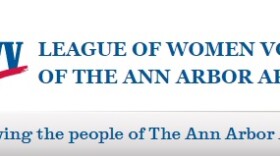This week on “In The Public Interest,” our bi-weekly conversation with the League of Women Voters of the Ann Arbor Area, 89.1 WEMU’s Lisa Barry speaks with league member Margaret Leary about an upcoming ballot proposal dealing with redistricting in Michigan…
League member Margaret Leary is the redistricting education coordinator for the Ann Arbor area. She talks about gerrymandering, which refers to politicians drawing maps for election districts so as to keep them and their party in power. It means politicians choosing their voters, rather than the democratic method of voters choosing their politicians.
She says the problem comes from two 21st Century developments. The first is the existence of huge data banks of information about individuals—way beyond census that allows those drawing the lines predict how individuals will vote and to be very selective in assigning voters to each district. The second is the deliberate and effective Republican effort to take over the state legislatures in key states in the fall of 2010, so that they could control the line drawing in 2011 after the 2010 census. Those lines are what we now use in Michigan.
Leary says the way the lines are drawn deprives many Michigan voters of the right for their vote to actually count. That’s because the lines are drawn to “pack” many Democrats into relatively few districts and to “crack other Democrats by dividing them up into districts that are heavily Republican which Democrats can’t possibly win. The negative effects of this gerrymandering aren’t just felt by Democrats - Republican and independent voters‘ interests are negatively affected too. The center, where many voters are, goes unrepresented, and the Legislature is weakened and paralyzed by ideological purists who view compromise as weakness rather than the achievement of the legislative process.
Leary explains the proposal on the November 7th ballot would create an independent citizens commission to draw the lines for legislative districts. After every 10-year national census, the 435 Congressional seats are redistributed to account for shifting population among the 50 states; that is done at the federal level. After that, each state is free to draw the lines—that is, create the maps—for each of the Congressional districts in that state. In Michigan, the legislature does that and also draws the lines for the state’s 38 State senate seats and 110 State House seats. Most states allow the legislature to draw the lines, but voters are reacting against that elsewhere as well as here. She adds the problem is that maps are drawn by the very politicians who will stand for election under the circumstances the politicians created. That makes voters, justifiably, feel their vote won’t count.
Leary says it pushes decisions about candidates into the party primary, which drives candidates to extremes. Most important, it results in a legislature that simply does not represent Michigan voters. She says our Legislature has at least twice undone what voters wanted: by reinstating the Emergency Manager law after voters rejected it and by attempting to frustrate voters’ desire to retain straight-ticket voting. The proposal would take the line-drawing power away from the legislature and put it in the hands of an independent citizens redistricting commission. It’s modeled after what California has done. In California, there are many positive outcomes: increased voter confidence; higher voter turnout; less partisan bias in elections; great accountability of politicians to voters; and an increase in competitive seats. (Common Cause of CA)
The Michigan Supreme Court ruled recently that the proposal could go on the ballot. The opposition, led by the Michigan Chamber of Commerce, argued that because the proposal would make many changes to the Michigan Constitution, the changes should be made be a constitutional convention rather than by voters. The Court did NOT buy that, stating that the 1963 Michigan Constitution did contain a provision for just such an independent commission, but later that provision was held unconstitutional because it created districts that were equal in geographic size, rather than in number of residents, as required by REYNOLDS V SIMS, the US Supreme Court’s “one person one vote” case.
The LWV of MI has endorsed Ballot Proposal #2, the Voters Not Politicians’ proposal, to create in independent citizens redistricting commission, so that after 2021, voters will choose their politicians rather than the other way around.
Non-commercial, fact based reporting is made possible by your financial support. Make your donation to WEMU today to keep your community NPR station thriving.
Like 89.1 WEMU on Facebook and follow us on Twitter
— Lisa Barry is the host of All Things Considered on WEMU. You can contact Lisa at 734.487.3363, on Twitter @LisaWEMU, or email her at lbarryma@emich.edu






